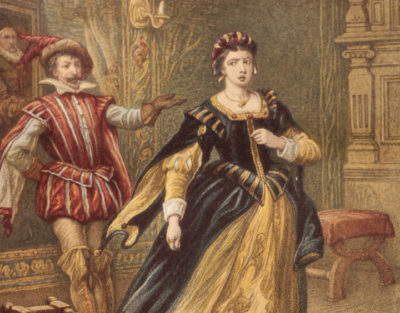
We’re all concerned about making our historical novels authentic. We research costumes, tools, and architecture. Yet all that effort can dissipate when the characters open their mouths, if their speech isn’t equally time-appropriate. But how can it be, when they are speaking Chinese or Medieval French or simply American English of the eighteenth century—rendered in “Modern”?
Like Us Yet Not
As we all know, dialogue can make or break a novel. It reveals the characters and their relationships; it can propel the story, up the pacing, drop clues, and set the tone of the book. It’s never easy to produce good dialogue. But it becomes even more difficult in the setting of the past, because people didn’t speak like us, yet we want to make their tone and meaning clear to modern readers.
Lost in Translation
Books taking place in non-Anglophone countries and cultures offer dialogue in translation, and so to some extent modern speech patterns may have their place. If two Romans are conversing in a colloquial manner, a certain modern sense of informality may be permitted, just to signal their tone. Still, we definitely don’t want to see slang from a particular modern generation (“optimal;” “I hear you”) or idiomatic expressions deriving from computer culture or even the Industrial Revolution (“gear down”). This is an anachronism, as odious as any other.
Two Eras Divided by a Single Language
But even more challenging are dialogues between English-speakers from the pre-modern era. Just how Shakespearean do you want your 16th-century characters to sound? Or 14th-century? Because authentic speech may make the meaning opaque to modern readers: the language has changed that much. The author has to make a judgment call, balancing the sense of antiquity with enough modernity to be comprehensible. Seeding it with too many “forsooths” and “verilys” starts to sound like a Monty Python sketch. Underplaying it is probably best: slightly formal modern English, with an avoidance of any glaring modernisms.
Knowledge is Power
Be prepared to do some research, then. If your story takes place in the eighteenth or nineteenth century, be sure that expression or usage really existed in that very year. More generally, I’ve been told that there is a mental cut-off line for slang in the 19th century. Any expressions that date from after that sound too modern for speakers of the Bronze Age, Classical Greece, or Medieval Spain—even “in translation.” And that means saying good-bye to expressions like “all right,” which has passed into acceptable non-slang speech and is really costly to surrender! Here is a good question for your Beta-readers: does my dialogue sound too modern?

Joni M Fisher
Amen, sister! I am put off by movies and books that use modern phrases and slang and curse words in stories set in the past unless they are satire. Anachronisms show the writer didn’t do enough research.
BJ Phillips
I remember watching the tv movie version of Elizabeth Bennett and Mr. Darcy going at it, conversation-wise. “Dearest” seemed to be widely used, along with “of course” and no contractions. After seeing that version (and it was so wonderful it is stuck in my brain), I can’t even remember what the dialogue was like in the book without going back to look. I can’t even imagine how some prehistoric person would speak, but you’re right in that it should not jump off the page as an obvious anachronism. As a reader, it would drive me enough nuts that I’d put the book down.
Ken Pelham
Good advice! It takes care (and multiple revisions) to strike that balance between readability and a sound of authenticity.